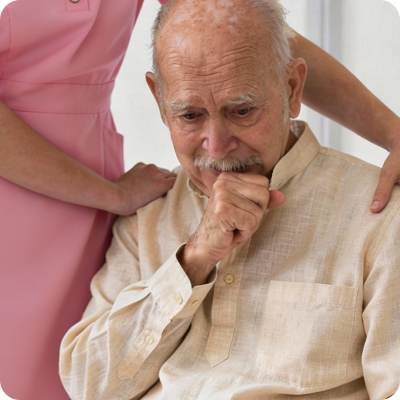Parkinson's Disease is a progressive neurological disorder that affects movement. It is caused by degeneration of nerve cells in the brain that produce a chemical called dopamine, which is responsible for controlling movement and coordination.
The most common symptoms of Parkinson's include tremors, stiffness, slow movements, and difficulty with balance and coordination. In addition to motor symptoms, Parkinson's can also lead to non-motor symptoms, such as changes in thinking and memory, mood changes, and sleep problems. Parkinson's can have a significant impact on daily life and relationships. Some common challenges include:
-
Physical Limitations: Parkinson's can cause difficulty with movement, including tremors, stiffness, and slow movements, making everyday tasks more difficult.
-
Cognitive Changes: It can lead to changes in thinking and memory, which can impact communication and relationships.
-
Emotional Changes: It can lead to feelings of anxiety, depression, and stress, which can affect relationships and overall well-being.
-
Fatigue: Parkinson's can cause fatigue, making it difficult to maintain a normal routine and participate in activities.
-
Caregiving Burden: For family members and loved ones, caring for someone with Parkinson's can be physically and emotionally demanding, leading to caregiver burnout.
At Epoch to manage the impact of Parkinson's Disease on the daily life and relationships of elders, we work closely with neurologists, physiotherapists and family to create a comprehensive treatment plan. This includes medication, therapy, and lifestyle changes. It is also important to prioritize self-care, maintain social connections, and seek support from family, friends, and community resources. Most importantly, families play a crucial role in the care of a loved one with Parkinson's Disease. Here are some ways we involve the family members in creating the care plan for elders.
Understanding the Condition: Educating the family about Parkinson's Disease, its symptoms, and its progression can help them understand the challenges their loved one is facing and how they can best support them.
Providing Emotional Support: Parkinson's Disease can be a stressful and emotional experience, and family members can play a crucial role in offering support, encouragement, and a listening ear.
Assisting with Daily Activities at Home: Family members can help with daily tasks, such as cooking, cleaning, and transportation, to reduce the burden on their loved ones and improve their quality of life.
Accompanying for Appointments: Family members can be part of the doctor's appointments and provide support and assistance during the appointment.
Encouraging Self-Care: Family members can encourage their loved ones to prioritise self-care, such as exercise, rest, and a healthy diet, which can help manage symptoms and improve overall health. Complement them when they complete the task. This will motivate the elder more.
Seeking Support: Family members may also benefit from seeking support and resources for themselves, such as support groups or counselling, to manage the emotional and physical demands of caregiving.
In India, there are organizations which provide caregiver support (https://parivarthanforparkinsons.wordpress.com/ , http://saar-foundation.org/, https://www.parkinsonssocietyindia.com/)
It's important for family members to work closely with the healthcare team to create a comprehensive care plan that meets their loved one's specific needs and goals. By taking a collaborative approach and seeking support when needed, we can help our loved ones with Parkinson's Disease maintain their independence and improve their quality of life.
Resources: https://www.parkinson.org/ https://www.apdaparkinson.org/resources-support/for-caregivers/ https://www.parkinsonassociation.org/parkinsons-support-groups/













